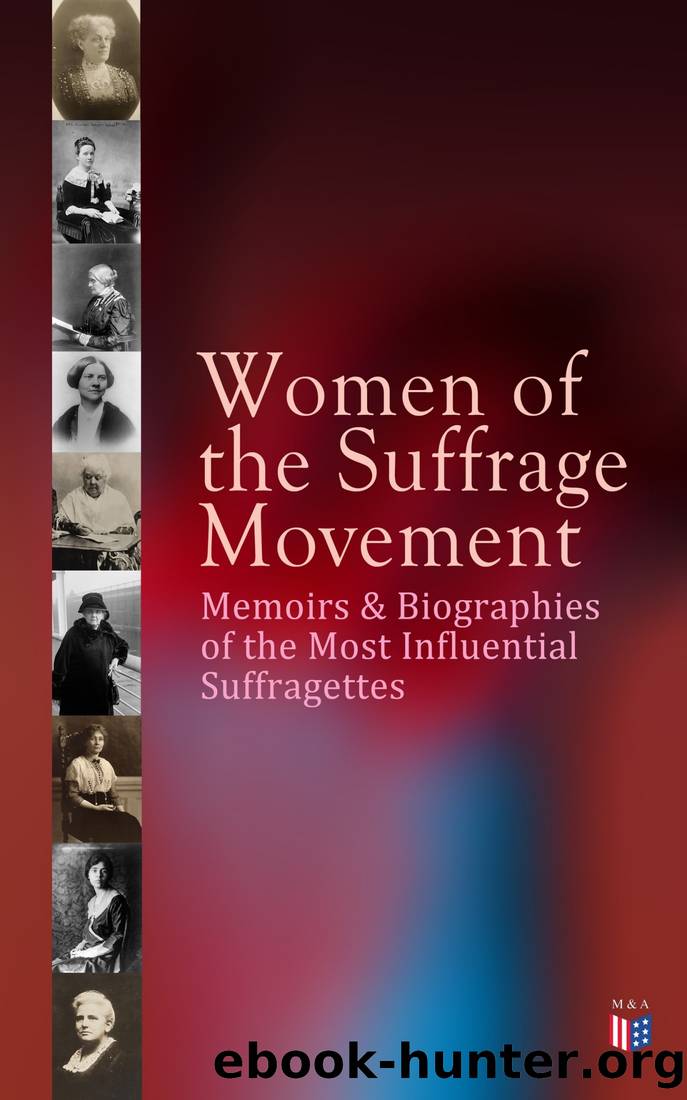Women of the Suffrage Movement: Memoirs & Biographies of the Most Influential Suffragettes by unknow

Author:unknow
Language: eng
Format: epub
Tags: Feminism & Feminist Theory, Nonfiction, Biography & Memoir, History, Social Science, Gender Studies, Social & Cultural Studies
ISBN: 9788026884781
Google: wKMVAQAAIAAJ
Goodreads: 4264503
Publisher: Madison & Adams Press
Published: 2018-03-13T04:00:00+00:00
These are the lessons of their own leaders; but the anti-suffragists pay no heed to them; it is little wonder then that they pay no heed to the great suffrage leader who has taught us that women, like men, do not need the franchise in order that they may govern, but in order that they may not be misgoverned.
One other consideration may be deduced from this extraordinary articleâ"Arguments for use in Poor Districts." If the anti-suffragists will put into cold print such "arguments" that women ought not to vote because they are occupied with the daily tasks of ordinary life and are not prepared to govern India or manage the Army and Navy, what may not the anti-suffragists say in private in the cottages which they visit in order to overcome the reluctance of working women to put their names to the anti-suffrage petitions?
The women who petition against women's enfranchisement are a type that we have always with us. Burke held them up to disdain and contempt in inimitable words in 1772, when Dissenters petitioned against Dissenters. The Five Mile Act and the Test and Corporation Act were then in force. The Test Act made the taking of the Sacrament according to the rites of the Church of England a necessary qualification for holding public office of any kind. The Five Mile Act forbade the proscribed Nonconformists from preaching or holding meetings within five miles of any corporate town. In 1772 these Acts were not often put into operation, but as long as they were in the Statute Book the Nonconformist leaders felt that they were doomed to live on sufferance; their friends in Parliament prepared a Bill for their relief from these outrageous disabilities. Opposition was, of course, at once awakened; it proceeded mainly from the King and the "King's friends." Their hands were strengthened by receiving a petition signed by dissenting ministers, who entreated Parliament not to surrender a test "imposed expressly for the maintenance of those essential doctrines upon which the Reformation was founded." They were for the time successful, but Burke's oratory has pointed the finger of scorn at them for all time. "Two bodies of men," he said, "approach our House and prostrate themselves at our Bar. 'We ask not honours,' say the one. 'We have no aspiring wishes, no views upon the purple....' 'We, on the contrary,' say the Dissenters who petition against Dissenters, 'enjoy every species of indulgence we can wish for; and as we are content, we pray that others who are not content may meet with no relief.'"[29]
We do not envy the Dissenters who petitioned against Dissenters in the eighteenth century, and future generations will probably mete out no very kindly judgment to the women who petitioned against women in 1889 and 1911: "As we are content, we pray that others who are not content may meet with no relief."
One most effective reply has been made by the suffragists to the allegation of their opponents that women do not desire their own enfranchisement.
Download
This site does not store any files on its server. We only index and link to content provided by other sites. Please contact the content providers to delete copyright contents if any and email us, we'll remove relevant links or contents immediately.
The Rules Do Not Apply by Ariel Levy(4957)
On the Front Line with the Women Who Fight Back by Stacey Dooley(4870)
The Lonely City by Olivia Laing(4798)
Bluets by Maggie Nelson(4548)
The Confidence Code by Katty Kay(4251)
Three Women by Lisa Taddeo(3424)
Not a Diet Book by James Smith(3411)
Inferior by Angela Saini(3311)
Confessions of a Video Vixen by Karrine Steffans(3301)
A Woman Makes a Plan by Maye Musk(3250)
Pledged by Alexandra Robbins(3170)
Wild Words from Wild Women by Stephens Autumn(3149)
Nice Girls Don't Get the Corner Office by Lois P. Frankel(3043)
Brave by Rose McGowan(2817)
Women & Power by Mary Beard(2767)
Why I Am Not a Feminist by Jessa Crispin(2748)
The Girl in the Spider's Web: A Lisbeth Salander novel, continuing Stieg Larsson's Millennium Series by Lagercrantz David(2716)
The Clitoral Truth: The Secret World at Your Fingertips by Rebecca Chalker(2713)
I Who Have Never Known Men by Jacqueline Harpman(2627)
